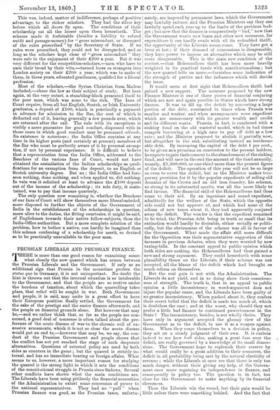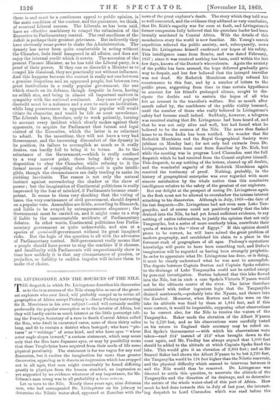PRUSSIAN LIBERALS AND PRUSSIAN FINANCE.
THERE is more than one good reason for examining some- what closely the new quarrel which has arisen between the Prussian Liberals and the Government. If only as an additional sign that Prussia in the meantime prefers the status quo in Germany, it is not unimportant. No doubt the hint is thrown out that the internal situation is so intolerable to the Government, and that the people are so restive under the burdens of taxation, about which the quarrelling takes place, that relief will be sought in war. Both _Government and people, it is said, may unite in a great effort to have their European position finally settled, the Government for the sake of the prestige and the easier finance afterwards, and the people on financial grounds alone. But however that may be,—and we rather think that, so far as the people are con- cerned, a good deal of nonsense is often talked about the pre- ference of the acute disease of war to the chronic evil of ex- cessive armaments, which it is not so clear the acute disease would put an end to,—however that may be, we say, the con- duct of the Prussian Government and people shows that the conflict has not yet reached the stage of such desperate alternatives. Questions of external policy are used by both sides as counters in the game ; but the quarrel is strictly in- ternal, and has no immediate bearing on foreign affairs. What seems to us, however, a more important reason for studying the quarrel is the strong light in which it sets the conditions of the constitutional struggle in Prussia since Sadowa. Several other conflicts have shown what the main conditions are. The Liberals have been using pitilessly the financial necessities of the Administration to extort some concession of power to the national representatives. They had no " pull " when Prussian finance was good, as the Prussian taxes, unfortu-
nately, are imposed by permanent laws, which the Government may lawfully enforce, and the Prussian Ministers say they can lawfully spend each year up to the limits of the previous bud- get ; but now that the finance is comparatively "bad," now that the Government wants new loans and other new resources, for expenditure it can hardly evade with all its redoubled thrift,
the opportunity of the Liberals seems come. They have got a lever at last ; if their demand of concessions is disagreeable,
they have power to impose an alternative which may be still more disagreeable. This is the main new condition of the contest,—that Hohenzollern thrift has been more heavily weighted in its practical tussle with constitutionalism ; but the new quarrel tells us more,—furnishes some indication of the strength of parties and the influences which will decide the issue.
It would seem at first sight that Hohenzollern thrift had gained a new support. The measure proposed by the new
Finance Minister is one of those pieces of financial conjuring
which are now and again possible in States which have strong finance. It was to fill up the deficit by converting a large portion of the debt, contracted in times when Prussia was smaller and weaker, and when arrangements were expedient which are unnecessary with its greater wealth and credit and its different wants. Prussia, in fact, is cumbered with a sinking fund on the old wasteful model, which in bad times compels borrowing at a high rate to pay off debt at a low rate ; and the Minister proposed to abolish it partially now, but altogether in the end, substituting instead an irredeem- able debt. By increasing the capital of the debt 1 per cent., to be given as a premium on conversion to the present holders, he expects togain their consent to theabandonment of the sinking fund, and will save in the end the amount of the fund annually, namely, £1,300,000, or one-third more than the present figure- of the deficit. The operation of this year will not be so large- as even to cover the deficit, but as the Minister makes tem- porary provision for it by the popular expedients of selling old domains of the Crown and an old iron foundry, his scheme,
so strong in its substantial merits, was all the more likely to find favour. The financial skill of the Hohenzollerns had thus
come to their aid. By an ingenious and sound expedient, admittedly for the welfare of the State, which the opposite side could not but approve of, and which had none of the odium of new taxes about it, they had apparently conjured away the deficit. The wonder is that the expedient remained to be tried, the Prussian debt being in truth so small that its
extinction would hardly be desirable, either socially or politi- cally, but the obviousness of the scheme was all in favour of the Government. What made the affair still more difficult•
for the Opposition was their argumentative suggestion of this measure in previous debates, when they were worried by new taxing-bills. In the constant appeal to public opinion which both sides are making, the Hohenzollerns had thus gained a new and strong argument. They could henceforth with some plausibility throw on the Liberals, if their scheme was not accepted, all the blame of the deficit which had brought so much odium on themselves.
But the real gain is not with the Administration. The Liberals do not yield, and in so doing show their conscious- ness of strength. The truth is, that in an appeal to public
opinion a little inconsistency in word-argument does not injure the popular cause, and the Liberals have been guilty of
no greater inconsistency. When pushed about it, they confess their secret belief that the deficit is made too much of, which is doubtless the case ; and at the worst, why should they not
prefer a little bad finance to continued powerlessness in the State ? The inconsistency, besides, is not wholly theirs. They have only in argument accepted the gloomy view of the Government as to the deficit, to use it as a weapon against them. When they come themselves to a decision in policy, they act on a steady judgment of their own. It is curious indeed to see how both sides, making a great fuss over the deficit, are really governed by a knowledge of its small dimen- sions. The Government hope to replenish their reserve by what would really be a great addition to their resources, the deficit in all probability being met by the natural elasticity of revenue ; while the Liberals at once see that there is only too much danger, without their giving any help, of the Govern- ment once more regaining its independence in finance, and consequently in policy too. The question is, in fact, too clear for the Government to make anything by its financial cleverness.
Thus the Liberals win the round, but their gain would be little unless there were something behind. And the fact that there is and must be a continuous appeal to public opinion, is the main condition of the contest, and the guarantee, we think, of eventual Liberal success. The Liberals, as has been said, have no effective machinery to compel the submission of the Executive to Parliamentary control. The real smallness of the deficit is perhaps their greatest grievance. But indirectly they have obviously some power to shake the Administration. The dynasty has never been quite comfortable in acting without the Chamber, feels itself hampered in all affairs, and does not enjoy the internal credit which it covets. The accession of the present Finance Minister, as he has told the Liberal party, is a proof of their power. If they can so discredit a Minister as to compel his dismissal, they are practically not without influence. And this happens because the contest is really not one between a genuine despotism and an oppressed people, but between two great institutions in a really popular government, the one which stands on its defence, though despotic in form, having no selfish aim, and being in almost all important matters in sympathy with the national sentiment. Any cause of popular discredit must be a nuisance and a sore to such an institution, while long perseverance in opposing the popular will would vitiate its character, and would be felt as most unwelcome. The Liberals have, therefore, only to work patiently, turning to account every incident which clearly makes against their opponents, to acquire for Parliament that formal and legal control of the Executive, which the latter is so reluctant to admit. In the meantime, they will not have a very bad Government, and the increasing discomfort of the dynasty in its position, its failure to accomplish as much as it really desires, can hardly fail to bring it to terms. As to the reluctance of the Government,—which is really confined to a very narrow point, there being daily a stronger disposition to obey the Chamber, while refusing to it the formal means of compelling obedience,—it is quite intelli- gible, though the circumstances are daily tending to make its yielding inevitable. The reason is not only the natural instinct against surrendering the shadow or the show of power ; but the imagination of Continental politicians is really impressed by the fear of mischief, if Parliaments became omni- potent. It seems to them very shocking that the voting of taxes, the very continuance of civil government, should depend on a popular vote. Assemblies are fickle, according to Bismarck, and liable to be swayed by extemporaneous eloquence ; the Government must be carried on, and it might come to a stop if liable to the unaccountable accidents of Parliamentary debates. In other words, Continental politicians fear Parlia- mentary government as quite unknowable, and aim at a species of quasi-self-government without its great imagined risks. But the logic of the question is all with the advocates of Parliamentary control. Self-government really means that a people should have power to stop the machine if it chooses, and familiarity with Parliaments will unquestionably show in time how unlikely it is that any circumstances of passion, or prejudice, or liability to sudden impulse will induce them to make that choice.



































 Previous page
Previous page